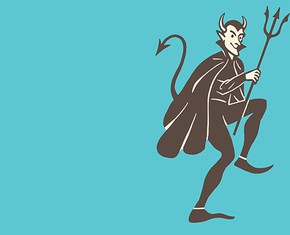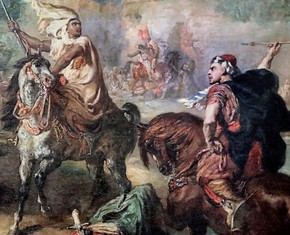The views expressed in our content reflect individual perspectives and do not represent the authoritative views of the Baha'i Faith.
If you’re a regular reader of BahaiTeachings.org, you already know the name of the prophet and founder of the Baha’i Faith, Baha’u’llah. You have read about His life, His Faith, and His many new teachings.
Perhaps you’ve felt attracted to those teachings because of their universality, their progressive, unifying spirit, or their potential for healing humanity.
That said, have you ever actually asked yourself, “Just exactly who is Baha’u’llah?” or “What, if any, authority does Baha’u’llah have?” or “Why should I consider listening to Him?”
RELATED: If the River of Everlasting Life Could Talk
These are valid questions! When I first encountered the Baha’i Faith, I asked them myself. In this essay, I’ll do my best to briefly answer them.
Baha’u’llah, who lived from 1817 to 1892, was not an ordinary man — quite the contrary. Raised in a noble family, at midlife, everything changed, putting Baha’u’llah constantly in danger. The Persian and Turkish governments, the Muslim clergy, and the masses in Baha’u’llah’s home country of Persia all collaborated to do everything in their power to stop Him, to persecute Him, and to put Him to death.
Why? Baha’u’llah had committed no crime — He had simply proclaimed the birth of a new religion, the Baha’i Faith. Baha’u’llah’s son and successor, Abdu’l-Baha said, ”O peoples of the world! The Sun of Truth hath risen to illumine the whole earth, and to spiritualize the community of man.”
This proclamation of a new revelation created an unprecedented furor that swept through Persia. Enormous numbers of inspired people began to follow Baha’u’llah’s teachings of unity, peace, and love, and thousands of Baha’is were persecuted, tortured, and executed. But no matter how hard Baha’u’llah’s enemies tried to hurt and destroy Him and His followers, Baha’u’llah was victorious. He never disobeyed anyone. He never rose up against His enemies. Like Christ and the Buddha and the many divine messengers who preceded Him, Baha’u’llah counseled kindness, compassion, and non-violence.
Baha’u’llah’s victories came by virtue of His unconditional love for God and humanity, His incomparable majesty, His warm compassion, His exceptional patience and fortitude, His unmatched integrity, the magnetic attraction of His kindness, the depth, power, and beauty of His writings, and the dynamic force of His example.
What in the world did Baha’u’llah say or do that drew such vicious opposition from such potent forces?
In a nutshell, Baha’u’llah claimed to be God’s messenger for this age — the promised world Messiah foretold in the prophecies and holy books of all the major religions, who brings a new outpouring of spiritual power destined to unite the human race and establish the long-awaited Kingdom of God on Earth. Baha’u’llah wrote:
This is the Day in which God’s most excellent favors have been poured out upon men, the Day in which His most mighty grace hath been infused into all created things. It is incumbent upon all the peoples of the world to reconcile their differences, and, with perfect unity and peace, abide beneath the shadow of the Tree of His care and lovingkindness. It behoveth them to cleave to whatsoever will, in this Day, be conducive to the exaltation of their stations, and to the promotion of their best interests.
Today, humanity is grieving, angry, disunified, groaning under the yoke of oppression and tyranny, at war, yet yearning for permanent world peace. Baha’is believe the Creator sent Baha’u’llah to enable us to achieve our most glorious destiny: the peaceful, prejudice-free unification of the entire human race based upon the oneness of humanity — the most important principle of the Baha’i Faith.
Baha’u’llah revealed universal teachings and an all-embracing, democratically-elected global administrative order that, when put into effect, has the ability to spiritually and materially transform and unite individuals, families, religions, and nations. There are Baha’is everywhere on the planet, from different and even opposing backgrounds, all now united in love and harmony. In Baha’i communities you’ll discover “unity in diversity” — the watchword of the Baha’i Faith. People from every conceivable background, religion, culture, class, racial group, ethnicity, and temperament have become Baha’is — and we welcome everyone who recognizes the hope in this new revelation.
RELATED: The Prophet Leaves the Prison
It has been many centuries since the coming of God’s previous messengers such as Moses, Christ, and Muhammad. Baha’is believe God has never left humanity alone — that He has spoken again through Baha’u’llah. The oneness Baha’u’llah proclaimed — the oneness of God, of humanity, of all Faiths and peoples — can now come about if we unite and work toward peace and harmony:
Laying the groundwork for global civilization calls for the creation of laws and institutions that are universal in both character and authority. The effort can begin only when the concept of the oneness of humanity has been wholeheartedly embraced by those in whose hands the responsibility for decision making rests, and when the related principles are propagated through both educational systems and the media of mass communication. Once this threshold is crossed, a process will have been set in motion through which the peoples of the world can be drawn into the task of formulating common goals and committing themselves to their attainment. Only so fundamental a reorientation can protect them, too, from the age-old demons of ethnic and religious strife. Only through the dawning consciousness that they constitute a single people will the inhabitants of the planet be enabled to turn away from the patterns of conflict that have dominated social organization in the past and begin to learn the ways of collaboration and conciliation.
That statement from the Baha’i International Community Office of Public Information, located at the Baha’i World Center in Haifa, Israel, calls on every member of the human family to recognize the revelation of Baha’u’llah, to follow its principles, and to join in the cause of unifying humankind.
















Comments
Sign in or create an account
Continue with Googleor